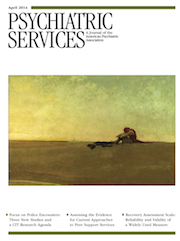Physicians’ Influence on Primary Care Patients’ Reluctance to Use Mental Health Treatment
Abstract
Objectives
The study examined attitudes of primary care patients toward mental health treatment and whether ambivalent or negative attitudes change after patients receive recommendations from their primary care physicians to seek treatment from a mental health professional.
Methods
Data were collected in face-to-face interviews with 902 Jewish patients aged 25–75 in eight primary care clinics in Israel. Measures included validated mental health instruments and a vignette eliciting patients’ readiness to consider treatment and potential influence of a physician’s recommendation.
Results
Initially, almost half of patients were reluctant to consider specialized mental health treatment. The probability of having a more positive attitude after the physician’s recommendation was significantly higher among patients with more severe clinical diagnoses.
Conclusions
A major finding was the positive impact of primary care physicians’ recommendations on reluctant patients. Encouraging physicians to discuss mental health issues would likely promote more positive attitudes and increase patients’ willingness to access treatment.



